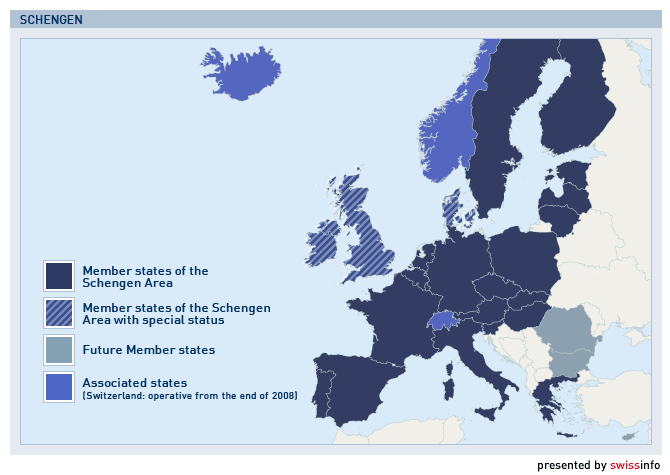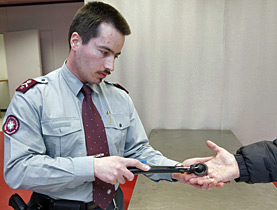Full steam ahead towards Schengen

Swiss police are now better equipped to track cross-border criminals after joining the new European search system on Thursday.
The Schengen Information System, or SIS, gives the security forces a more effective way to combat crime than the conventional Interpol system. One improvement is that with SIS, police have direct access to information about wanted persons and stolen goods.
It is shared by Europe’s 25 so-called Schengen states, all of which have signed up to an agreement removing border controls between them.
The Ripol search system, which has been used nationally in Switzerland until now, has been extended. Any inquiries now submitted to it will automatically go Europe-wide. If there is a hit, the Federal Police Office can be asked to supply the details from its Sirene office. (Sirene stands for Supplementary Information Request at the National Entry.)
Each of the Schengen states has a Sirene office. The Sirene office in Bern, which employs 31 people, including 11 police, acts as a national hub for exchanging information with SIS.
However, the Swiss traditional cantonal-based police system has not changed.
“Even with SIS it is still the cantonal investigative authorities and cantonal police who are responsible,” Benedikt Scherer of the Federal Police Office told swissinfo.
Thousands of inquiries
About 80 per cent of daily inquiries come from the police, but other bodies also have access to SIS. They include customs offices, passport offices, traffic offices, the Federal Migration Office and diplomatic missions. In all the system receives about 20,000 enquiries a day.
If a search is launched for a person or an object, it takes only minutes for the information to appear on all SIS screens.
In July there were over 27 million items in the SIS data bank as a whole. Of these, 26 million were objects such as weapons, cars, registered banknotes identity documents and blank passport forms, stolen to make false identities.
As for the million or so items of data about people, nearly three quarters concerned people banned entry to the Schengen space. About 70,000 were for wanted people, and 23,000 were warrants for the arrest of people to be extradited.
Switzerland has so far entered some 1,200 names of people it wants to arrest, and the Migration Office has put in the names of 21,000 people who are banned from entering Switzerland. Switzerland has also listed some 280,000 stolen items.
Data protection
All citizens have the right to inquire whether their names figure in the system. They can do this via a written submission to the Federal Police Office.
Hanspeter Thür, Switzerland’s data protection commissioner, sees problems arising here not so much for legal reasons, but because there may not be enough staff to carry out checks. In Switzerland data protection is carried out at cantonal level.
Joining SIS is the latest stage in the long process of bringing the Schengen agreements fully into force in Switzerland.
When the Swiss people voted three years ago to join the Schengen and Dublin agreements, this meant that the country had to adopt all the provisions of the agreements.
Now this undertaking is taking shape. The sections of the agreement covering justice and asylum have been in force since March.
SIS is an integral part of the deal. Switzerland can only become part of the Schengen space with its open borders if SIS is working properly. In September European experts will check how things are going.
Switzerland hopes that the entire Schengen package will come into force in December.
swissinfo, adapted from a German article by Alexander Künzle
The idea of the free movement of people and goods dates back to the 1957 Treaty of Rome.
It was first applied by the Benelux countries in 1958, followed by Germany and France in 1984.
In 1985 these five countries signed the Schengen agreement, abolishing checks on persons at frontiers.
The specific regulations to implement the agreement were agreed in 1990.
All countries involved must be part of the Schengen Information System (SIS). The police search system replaces frontier checks.
SIS stores the following categories of personal data
Persons wanted for extradition
Persona non grata in a particular country
Minors or mentally handicapped patients (for protection)
Persons wanted as witnesses to serious crimes
Persons under suspicion to be monitored
A second version, SIS II, has been under development since 2002.


In compliance with the JTI standards
More: SWI swissinfo.ch certified by the Journalism Trust Initiative


You can find an overview of ongoing debates with our journalists here. Please join us!
If you want to start a conversation about a topic raised in this article or want to report factual errors, email us at english@swissinfo.ch.